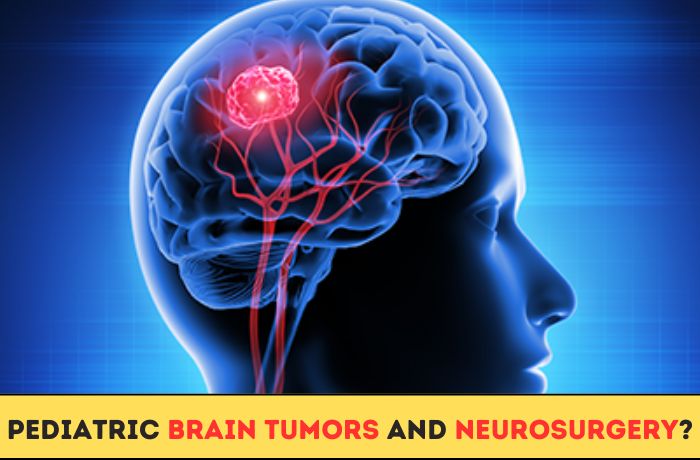Introduction :
When it comes to the health of our children, nothing is more urgent or important. That’s why understanding conditions like pediatric brain tumors and the critical role of pediatric neurosurgery cannot be overstated. This blog is meant to help shed light on this complex topic in an accessible way. Whether you’re a concerned parent, a healthcare professional, or simply a curious reader, you’ll find valuable insights into the intricacies of pediatric brain tumors and how neurosurgery plays a pivotal role in treating this challenging condition. By the end of this read, you’ll also be introduced to Dr. Ninad Patil, a highly skilled Pediatric Neurosurgeon in Pune known for his expertise and compassionate care.
Why This Topic Matters to You :
Pediatric brain tumors are not just medical conditions; they are battles that young warriors and their families face every day. These tumors disrupt the delicate balance of a child’s life, affecting their physical health, cognitive abilities, and emotional well-being. As such, understanding the complexities of these tumors and the role of neurosurgery is essential for everyone touched by this journey – parents, caregivers, and medical professionals alike.
Understanding Pediatric Brain Tumors:
Pediatric brain tumors are masses or growths of abnormal cells that occur in a child’s brain or the tissues and structures that are adjacent to it. Unlike adult brain tumors, pediatric brain tumors are not only situated in different parts of the brain but also behave differently, making specialized treatment and management necessary.
Here are some common symptoms:
- Persistent headaches, especially worse in the mornings
- Vomiting, nausea, or dizziness
- Vision problems, including blurry vision or double vision
- Difficulty with balance or coordination
- Seizures
- Speech or language difficulties
Understanding these signs can help parents seek prompt medical attention.
Common Brain Tumors in Children
There exist more than 100 various types of brain tumors, These are just some of the most common brain tumors in children.
- Astrocytoma: This is a common type of glioma in children, accounting for about half of all pediatric brain tumors. There are four types of astrocytoma: pilocytic astrocytoma, diffuse astrocytoma, anaplastic astrocytoma, and glioblastoma multiforme.
- Brain stem gliomas: These are tumors that form in the brain stem, the area of the brain that controls vital functions such as breathing and heart rate. Because of their location, these tumors can be aggressive and difficult to treat.
- Choroid plexus tumors: These tumors arise in the choroid plexus, the part of the brain that produces cerebrospinal fluid. They are more common in children and can range from benign to malignant.
- Ependymomas: These are tumors that begin in the ependymal cells that line the ventricles of the brain and the central canal of the spinal cord. Ependymomas are most common in children and can be either benign or malignant. The location and grade of the tumor play an important role in determining treatment and prognosis.
- Medulloblastomas: These are highly malignant brain tumors that can affect children. They usually form in the cerebellum, the part of the brain responsible for coordination and balance. Medulloblastomas grow rapidly and require aggressive treatment, including surgery, radiation, and chemotherapy.
The Role of Pediatric Neurosurgery:
Pediatric neurosurgery is a specialized field that focuses on the management and surgical treatment of neurological conditions in children, including brain tumors. Pediatric neurosurgeons use various techniques to remove tumors, alleviate symptoms, and improve quality of life. They’re also instrumental in the diagnosis and long-term management of these conditions.
Pediatric neurosurgeons are the superheroes in the fight against pediatric brain tumors. Their expertise lies in:
- Minimally invasive surgery: Whenever possible, these surgeons strive for minimally invasive techniques to minimize their impact on healthy brain tissue.
- Tumor removal: Their goal is to remove as much of the tumor as safely possible, maximizing the chance of successful treatment.
- Preserving function: Pediatric neurosurgeons understand the developing brain and prioritize preserving vital functions like speech, movement, and vision.
Treatment options for pediatric brain tumors can include surgery, radiation therapy, and chemotherapy. The choice of treatment depends on the type and location of the tumor, as well as the child’s overall health.
Meet Dr. Ninad Patil | Your Trusted Neurosurgeon in Pune:
For families facing the frightening reality of a pediatric brain tumor, finding a skilled and compassionate neurosurgeon is critical. Dr. Ninad Patil stands out as a leading pediatric neurosurgeon in Pune, offering advanced care with a focus on patient-centered practices. His expertise in the latest surgical techniques and his commitment to the well-being of his young patients make him a valuable asset in the fight against pediatric brain tumors.
Dr. Patil has earned a reputation as a highly skilled Pediatric Neurosurgeon in Pune. His compassionate approach towards his patients and their families ensures that they receive not only the best medical care but also the emotional support they need to navigate this challenging journey.
Conclusion:
Understanding Pediatric Neurosurgery and brain tumors is not just for medical professionals. It’s a topic that touches the lives of many families. By staying informed, you can ensure that you’re prepared to provide the best support for your child should the need arise.
Remember, when it comes to your child’s health, don’t delay in seeking the expertise of specialists like Dr. Ninad Patil, a renowned neurosurgeon in Pune. Your child’s health and well-being are worth it.



